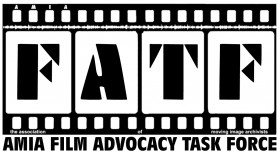Does the widespread availability of electronic, binary versions of
film material – increasingly, the only way one is being allowed to view it – truly constitute access?
“Access” is defined in the following ways:
> The means or opportunity to approach or enter a place
> The right or opportunity to use or benefit from something
> The right or opportunity to approach or see someone
> The process of obtaining or retrieving information stored in a computer’s memory
> Denoting broadcasting produced by minority and specialist interest groups, rather than by professionals: access television
> An attack or outburst of an emotion
> To approach or enter (a place)
> To obtain or retrieve (computer data or a file)1
Access to content is not the same as access to an experience. The relationship of the word to the field of information technology is also noteworthy in this context.
An interesting aspect within the definitions is the concept of entry. Previous work by the Task Force has highlighted the important physiological aspects of the engaging film projection experience. Does greater emotional engagement with creative and artistic works of cinema in this way (as argued) assist entry into the narrative, thematic, and spatial milieu created by the filmmaker? Is any restriction of cinematic work “access” to purely electronic means a form of denial of access – ultimately, a form of censorship?
The reference to rights (in the broad sense) is thus also significant. Whilst new means of access are valuable and important, they should complement and extend existing and traditional means of access, not supplant them. An ideology of supplantation is incompatible with fundamental rights.
These issues invite critical examination of words and phrases that are very often used unconsciously. “Access” should not be co-opted and its meaning corralled for particular political or ideological purposes. Rather, one seeks to qualify the term in order to emphasise the proper scope of its meanings. Thus equal access (or, equality of access); physical access; diverse access; holistic access; broad access; general access; inclusive access – to give examples of some phrases that could be adopted and propagated.
In this way, the general meaning of “access” is reinstated, in this context covering a diverse range of formats and platforms: including, importantly, traditional methods of access.
Such plurality is healthy and a necessary prerequisite for the ongoing development of the field.
1. cf. Oxford Dictionaries
Image by Alfred Hutter
[Edited on January 16, 2015. Reason: “Equal Access” and “Equality of Access” added to list of terms above]

